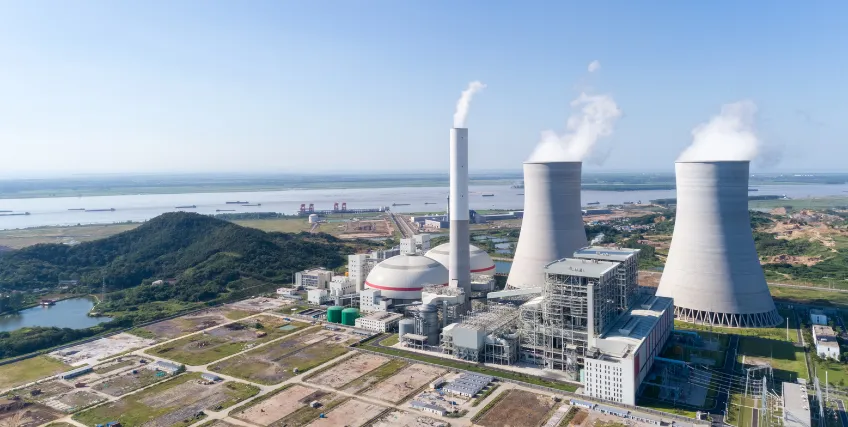Funding High-Heat Industries: A Simple Guide to Business Loans
October 28, 2025 | Last Updated on: October 28, 2025

Thermal power companies are essential to America’s energy grid but face rising costs, regulations, and limited access to traditional financing. Banks often have slow approvals and strict terms, leaving energy-intensive businesses underfunded.
Industrial loan companies offer a better fit, providing tailored financing for thermal power operations. Whether you're building, upgrading, or need working capital, this guide covers how to qualify, what lenders expect, and top loan options available today.
Here's how the right financing partner can help high-heat businesses stay powered and competitive.
Why Thermal Power Businesses Face Financing Challenges
Thermal power generation is capital heavy. You’re dealing with large infrastructure, complex equipment like boilers and turbines, and long development timelines. That means higher upfront costs and delayed returns. For a small business, this creates serious cash flow challenges.
Then come the regulatory pressures. The U.S. Energy Information Administration (EIA) notes that thermal plants face increasing scrutiny on emissions and sustainability standards. This adds to the need for new equipment purchases and technology upgrades, which are costly investments.
Banks are cautious. Long-term ROI, risk from environmental penalties, and the shift toward cleaner energy make traditional financial institutions reluctant to offer loans.
That’s why many business owners are turning to a private industrial loan company to meet their financing needs. These companies specialize in risk-heavy industries and can provide faster, more flexible funding solutions.
The bottom line? If you’re a small business owner in the thermal power sector, you need a partner who understands your financing challenges and who offers loan products suited to your reality.
What Lenders Look for in High-Heat Industries
Even flexible industrial loan companies want assurance that your business is stable. Here’s what most lenders will assess:
- Credit Score: Strong credit history helps. A score above 650 improves your odds.
- Financial Statements: Up-to-date income statements, balance sheets, and cash flow records are essential.
- Collateral: Many business and industrial loans require assets such as equipment, land, or receivables.
- Contracts: Power purchase agreements (PPAs) helps in proving steady revenue.
- Licenses and Permits: Demonstrating environmental and operational compliance builds credibility.
Your business plan matters too. Be clear about your loan purpose; whether it’s for equipment financing, working capital, or new real estate. Show how the funds will support business growth or energy efficiency upgrades.
The more data you can provide, the more confident the lender is. Especially for a high-heat operation, you must show how your small business can weather industry volatility.
The right industrial loan company will guide you through the application process and help ensure your documents meet requirements.
Industrial Loan Options in 2025
Different needs call for different loan options. Here are top choices thermal businesses are using today:
1. Equipment Financing
With this type of financing, companies can buy boilers, turbines, pollution control systems, or HVAC equipment. It helps to spread the cost over time. Equipment financing is ideal for thermal power operators upgrading systems to meet regulations.
2. Working Capital Loan
Cover fuel costs, maintenance, payroll, and vendor payments. These loans are quick and flexible, perfect for short-term operational support.
3. Commercial Real Estate Loans
If you’re looking to expand your site, these loans help fund land or facility construction. Collateral is often required.
4. Bridge Loans
Need quick cash before a contract closes or equipment arrives? These short-term solutions offer fast approval.
5. Business Line of Credit
With a business line of credit, you can draw what you need, repay, then borrow again. It is great for cyclical cash flow or emergency fixes.
While banks may restrict access, a private industrial loan company is often more open to industry risks. They offer custom loan terms, faster decisions, and fewer barriers for small business borrowers.
Compare interest rates, repayment terms, and fees carefully. Each type of financing meets a different business need. Choose based on your timeline, goal, and collateral.
Role of Private Lenders and Non-Bank Industrial Loan Companies
As bank lending tightens, non-bank financial institutions are stepping up. A private industrial loan company can be the bridge thermal businesses need. Recently, Britain’s Aegis Energy has received a £100 million ($122 million) investment from private equity firm Quinbrook Infrastructure Partners to develop five multi-energy refueling stations for commercial vehicles. This news gives a glimpse of the increasing role of private lenders in financing thermal-power projects.
These private lending companies often provide:
- Faster Approvals: Some loans close in days, not weeks.
- Flexible Requirements: They consider broader factors, like project feasibility, not just credit scores.
- Tailored Products: From startup loans to equipment financing, you get funding aligned to your stage and needs.
Private lenders often provide faster access and better terms than traditional banks, especially for complex industries like thermal power. They understand the nuances of power contracts, regulatory shifts, and energy demand when structuring deals.
Energy-efficient upgrades may come with incentives, which private lenders can incorporate into financing packages.
It’s essential to choose a lender with transparent terms, experience in the energy sector, and strong client support. A solid partnership can help thermal power businesses expand, modernize, and strengthen long-term plans.
How to Qualify for an Industrial Loan
Here’s a basic checklist to boost your approval odds with any industrial loan company:
- Good Credit Score (ideally 650+)
- Clear Business Plan showing how funds will be used
- Updated Financial Statements
- Asset List for collateral
- PPA Contracts or customer agreements
- State and Federal Licenses
Some loan options may also require:
- Monthly cash flow reports
- HVAC system specs (if applying for upgrades)
- Vendor quotes for equipment purchases
You don’t always need perfect credit. Many companies offering business and industrial loans care more about cash flow and future growth. Just be upfront.
Tip: Organize documents before you start the loan application. It speeds up the approval and shows professionalism.
Also, review your repayment terms carefully. Choose what works for your revenue cycle - monthly payments vs. seasonal repayment, short-term vs. long-term loan.
Tips for Comparing Loan Offers
All loans aren’t built the same. As a business owner, comparing offers is key to making an informed decision.
Look at:
- APR vs. Interest Rate: APR includes fees. It gives a true cost picture.
- Loan Amount vs. Need: Don’t borrow more than you can repay.
- Loan Term: Match this with your project duration or cash flow cycle.
- Upfront Fees: These can eat into capital fast.
- Repayment Flexibility: Can you prepay without penalty?
- Customer Support: Choose companies known for helping throughout the application process.
Avoid common traps:
- Confusing variable rates with fixed
- Not factoring in downtime during construction or upgrades
- Not budgeting for maintenance on new equipment
Most importantly, work with a trusted industrial loan company that understands thermal power business needs. A good partner explains fine print, suggests better loan products, and helps set your business up for success.
Industry Trends: Financing Clean Energy Shifts
Clean energy goals are reshaping the thermal power landscape. And industrial loan companies are adapting too.
More lenders now fund:
- Hybrid models combining thermal and solar
- HVAC upgrades for energy efficiency
- Pollution control systems
Some even package incentives from the U.S. Department of Energy or Small Business Administration.
This opens up new financing options for small businesses looking to stay compliant and competitive.
As a thermal operator, aligning your funding with these shifts could open doors to better loan terms, new partnerships, and long-term savings.
Ask your industrial loan company about ESG-linked loans or green upgrade bundles.
Conclusion
Thermal power businesses need more than just funding. They need the right funding.
An industrial loan company can offer targeted support through tailored loan products, faster processing, and industry expertise.
Whether you're seeking a working capital loan, upgrading HVAC systems, or breaking into new markets, the right loan can drive your business forward.
Take time to compare financing options, prepare strong documentation, and choose a partner who gets your world.
Because in a high-heat industry, smart capital isn’t a luxury; it’s a necessity.
FAQs
1. What qualifies as an industrial loan in the thermal power sector?
An industrial loan typically funds large-scale equipment, facility upgrades, or operational costs in high-capex sectors. For thermal power, this includes boilers, air conditioning systems, and site expansion. You can also use it for energy efficiency projects. An industrial loan company will review your financials and business plan to determine if the loan aligns with your business needs.
2. How do I choose the right industrial loan company for my business?
Focus on experience, product range, and customer service. The best industrial loan company will offer customized loan options, explain your repayment terms, and guide you through the process. Check reviews, loan terms, and whether they’ve worked with energy-intensive businesses before. Look for transparency and fast communication.
3. Are there industrial loans available for renewable energy upgrades?
Yes. Many industrial loan companies now offer funding for cleaner HVAC systems, pollution control tools, and hybrid power solutions. These loans often come with better interest rates and can be bundled with state or federal incentives. Check with your provider for green loan products.
4. What documents are needed to apply for an industrial loan?
Most business and industrial loans require tax returns, profit & loss statements, balance sheets, cash flow reports, and a business plan. Collateral info, licenses, and vendor quotes are also common. An industrial loan company will specify exact needs during your application process.
5. Can small thermal power plants qualify for business and industrial loans?
Absolutely. Even smaller operators can secure funding through a good industrial loan company. As long as your loan application shows financial health and operational viability, you can access business and industrial loans for upgrades, new equipment, or expansion.




